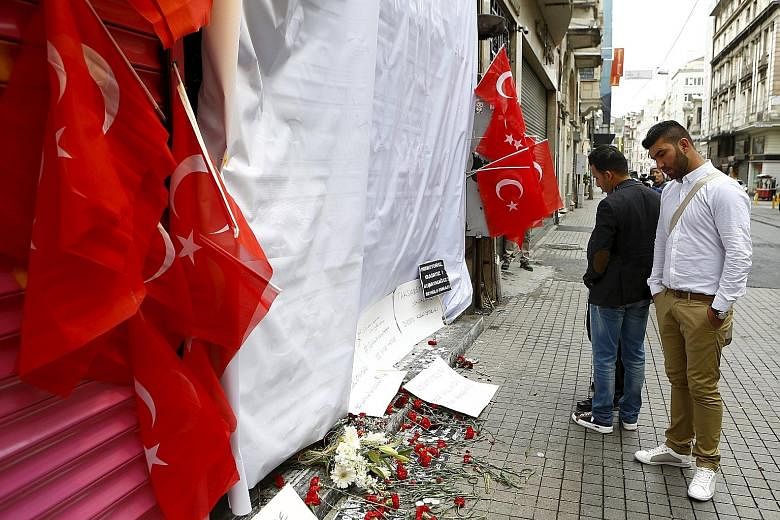ISTANBUL • A man linked to the Islamic State in Iraq and Syria (ISIS) militant group carried out the suicide bombing in Turkey that killed four bystanders on a bustling Istanbul street, Interior Minister Efkan Ala said yesterday, the second time the authorities have tied the militant group to an attack in the country this year.
Mr Ala identified the bomber as Mehmet Ozturk, born in 1992. Hurriyet newspaper said DNA testing matched samples taken from his father, who lives in Gaziantep, in southern Turkey.
No one has claimed responsibility for the bomb that exploded on Saturday just off Istiklal Caddesi, Istanbul's main pedestrian street. Three of the dead and 10 of the wounded were Israelis, but Israeli Foreign Ministry spokesman Emmanuel Nahshon said it was too early to determine whether they had been targeted. The Israeli government raised its travel alert on Turkey, advising its citizens not to travel there.
"The evidence we have shows the attacker Mehmet Ozturk was linked to the Daesh terrorist organization," Mr Ala said, using an Arabic acronym for the Al-Qaeda breakaway group. Five people have been detained so far in connection with the attack, he said.
Nato member Turkey faces multiple security threats. As part of a United States-led coalition, it is fighting ISIS in neighbouring Syria and Iraq. A 21/2-year ceasefire with Kurdish militants in its south-east collapsed last July, triggering the worst violence since the 1990s.
More than 80 people have been killed in four attacks in Ankara and Istanbul this year.
TAK, which splintered from the autonomy-seeking Kurdish PKK, has claimed credit for two of them, and the authorities have blamed two on ISIS.
Police were on high alert across Turkey yesterday after the previous day's attack and due to concerns about potential clashes between security forces and Kurdish militants during a spring festival at the weekend that is widely celebrated by Kurds.
Malaysian tourist Puteh Ismail, 69, told of the horror of the Istanbul attack, which occurred near where she was shopping with her daughter Raszatol Ishak, 44. It was the last day of their holiday in Turkey.
"At that time, we were looking at items in a shop that was packed with people. All of a sudden, there was a loud explosion and the situation turned chaotic," she told The Star's Bahasa Malaysia portal mStar Online yesterday.
"While we were ordered to vacate the area, I saw bodies sprawled on the street… (I) saw a head that was already detached from the body rolling on the floor," she said.
Ms Puteh and her daughter went to Turkey as part of a tour group. They arrived on March 13, the day before a suicide blast in Ankara killed 35 people.
"For this moment, I can think only of returning to Malaysia. Hopefully we will arrive home safely," she said.
Saturday's attack appeared similar to a January suicide bombing blamed on ISIS that killed at least 12 German tourists. In that attack, the suicide bomber blew himself up among tourists near Istanbul's historic centre.
BLOOMBERG, REUTERS

